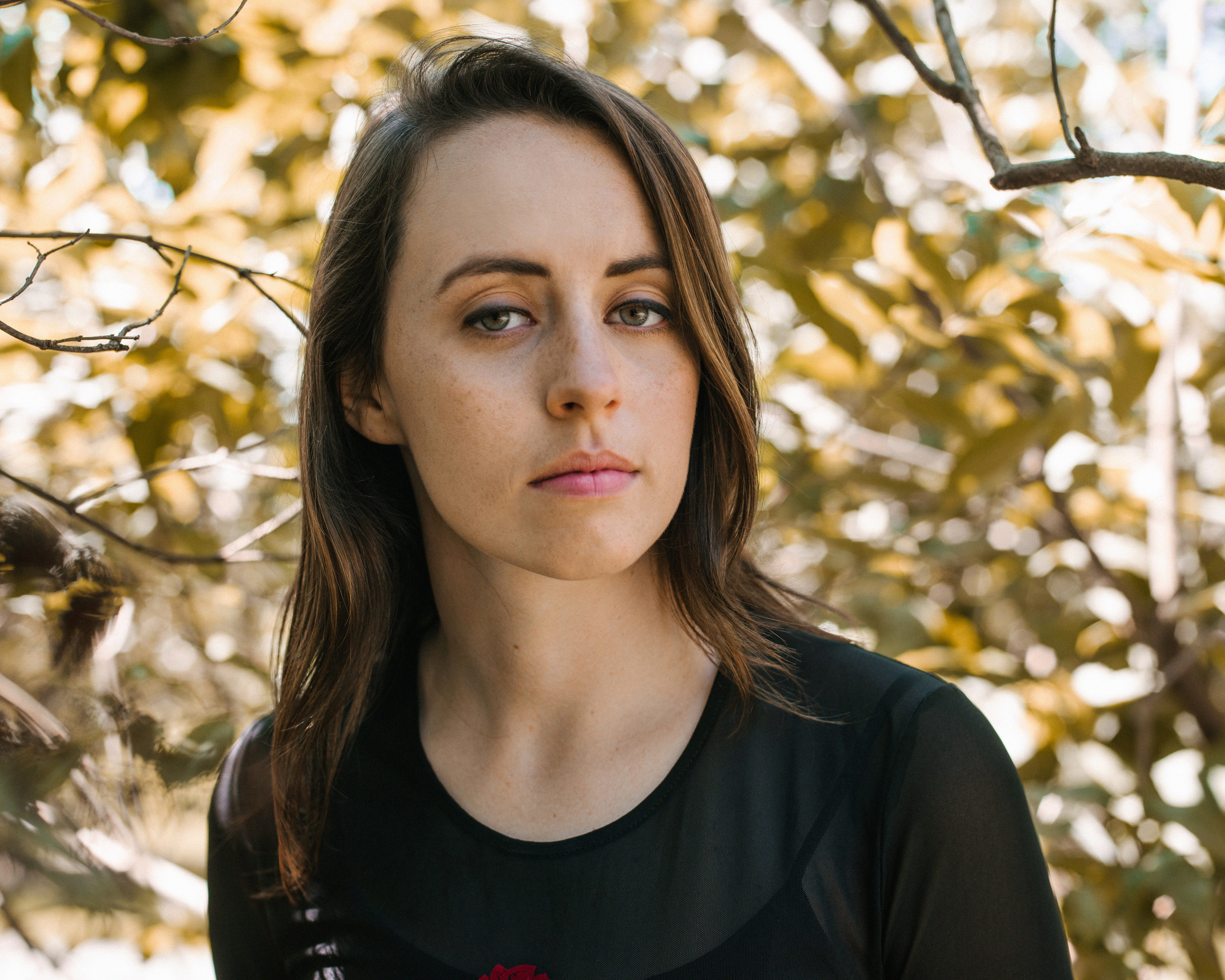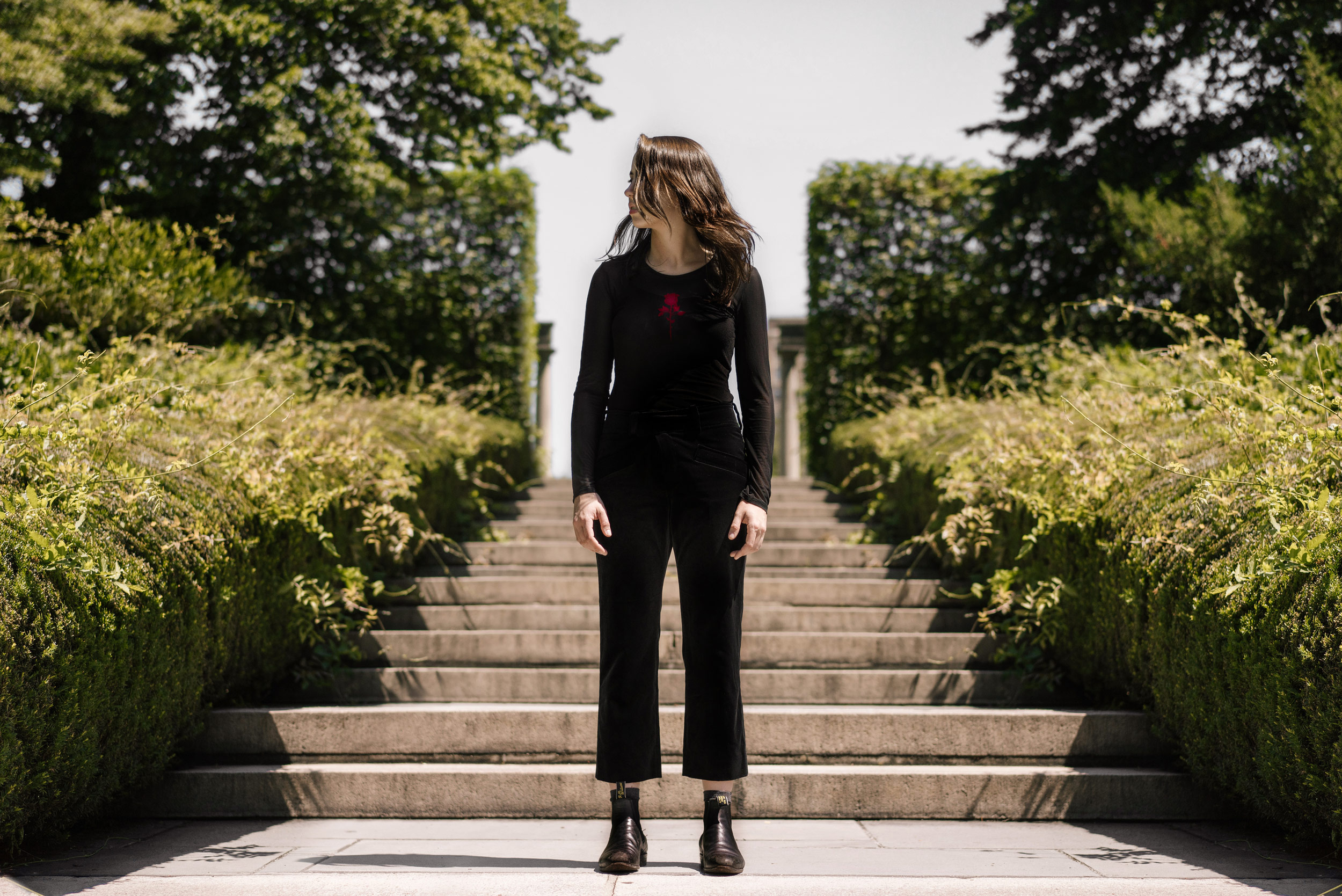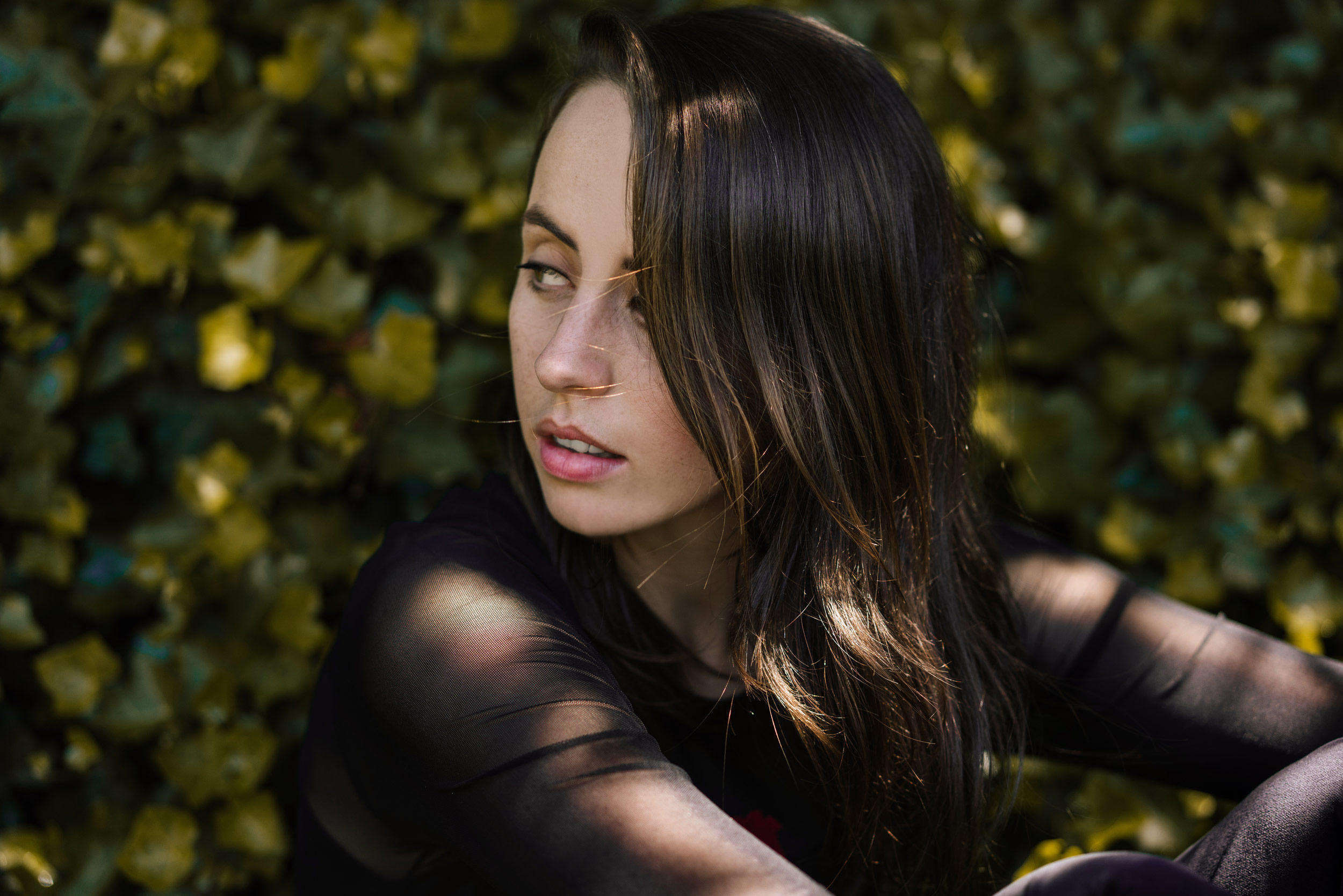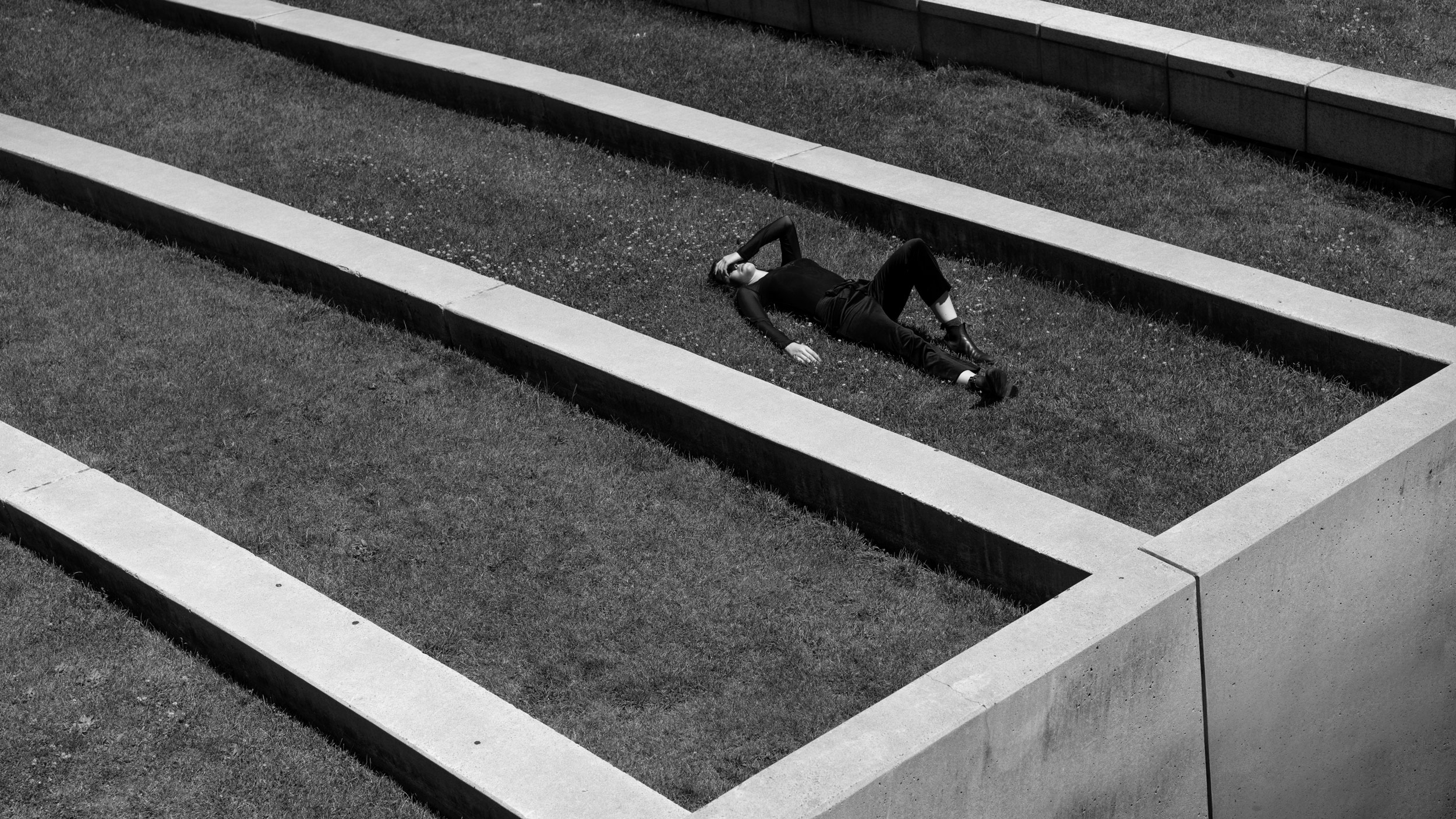
- Interview by Tina Essmaker August 22, 2017
- Photography by Julia Hembree
Gordi
- musician
Folktronica singer/songwriter Sophie Payten, AKA Gordi, hails from rural Australia, where she grew up on a farm surrounded by wide-open landscapes, and a family with a deep appreciation of music. Here, she opens up about going away to boarding school at age 12, and her eventual path toward songwriting; about the Reservoir—the name of her new full-length album, and a metaphorical space that influences her work; about following the “green lights” toward what’s next; and how she manages to balance her creative life while finishing a degree in medicine.
You grew up on a farm in rural Australia. Tell me about what it was like to grow up there and how your childhood influenced your ideas about creativity. I grew up outside of a little town called Canowindra on a farm called Alfalfa. It’s a beautiful place—my family has lived on that property for about 120 years. I had a good friend who lived down the road who had horses, and sometimes in the afternoon we’d catch the bus home and get off there and ride.
My parents had a garden that sprawled down and met the paddocks that met the river. The room where all of our musical instruments were kept overlooked this, and I grew up playing the piano looking out over that magnificent landscape. While it’s never influenced my lyrical content directly, I’ve always tried to preserve some idea of space in the soundscapes of my songs.
Do you come from a musical family, then? You mentioned a room full of instruments. Yeah, (laughing) my mom is a piano teacher. She has nine brothers and sisters, like a good-old-Irish Catholic family. They had a von Trapp-esque vibe going on, and could all sing and play instruments.
I’m the youngest of four, and we all learned the piano growing up. Then my brother started to learn guitar, and I copied him. I never had lessons, but I picked it up and learned some chords. I stopped piano lessons at about age 12, but I kept playing, and had enough of the basics down to eventually start writing music.
You went away to boarding school at age 12, which I know is a tradition for many families, but that seems so young. We arrived at boarding school on a Sunday—I remember that day so well. My older sister had been to that school, and she had told me that the most important thing was your back-to-school outfit. So we planned out my best denim skirt and boat shoes, which were totally fashionable at the time.
My parents took me up to the dormitory—it was an enormous room with 26 beds lined up next to each other. Mine was right at the entrance, under this big fluorescent exit sign. I had a cupboard next to that, where I could keep my personal things, and each of us also had a narrow cupboard in the hall to keep our clothes.
It was the most normal thing for me in the world; all of my siblings had done it, and my dad had done it. Families make a lot of sacrifices so their kids can go to these boarding schools and get a good education, because the opportunities aren’t as great when you live in the country. I was aware of how lucky I was, and how different my life might have been if I hadn’t gone.

How did the role of music change in your life during that time? I released my anxiety about moving away from such a familiar and homey environment through songwriting. I was grappling with all of the things teenagers grapple with, and living independently at such an early age, which forced me to grow up quickly.
I liked being social, but I also liked carving out time for myself. Playing music was the way I did that. There was this room below us, with a beautiful grand piano. In the first year of school, I remember putting my ear on the floor because I could hear someone playing. It was a privilege the older girls had to use it whenever they wanted, so I’d wait until no one was there, and run down and play as much as I could until an older girl kicked me out. It became a refuge for me.
I started writing songs, and even though I hadn’t had much life experience, I found that I had enough to get some words out. Eventually, when I was 16, I got a group of musical friends together—one played violin, another viola, and one on piano. I played guitar. I had written this song, and some parts for each of them, and I clearly remember the first time we played the song. They nailed it. I couldn’t even sing, because I was smiling so much. It was the best thing I’d ever seen—that something I had imagined in my head was now being heard aloud.
When was the first time you performed? We had this annual school music festival, that about four thousand people came to, and I played that song, with those girls. It was the first time I’d ever played in front of a group of people, including my parents. It was a big moment for me. I had been so nervous, but when I got up there, the nerves totally disappeared and I just enjoyed it. I hadn’t seen the girl who played violin for me since we were in school. The funny thing is, I just got back from a two month tour, where we played this show at Bergenfest, in Norway. When we posted that we were playing there, she messaged me on Facebook. She actually lives in Bergen. So when we played in this 750-year-old viking hall that night, she jumped up with the band and played along with us. It was incredible.
Was music something you wanted to pursue from that point forward, or did it happen more organically? I never thought about it as a career. My siblings had all been to university, and that was going to be the path for me as well. I was focused on what degree I was going to choose, not writing music.
But I kept writing, and about halfway through my first year, I went to this concert. It was an Australian artist, Missy Higgins. The Christmas before I started boarding school, I got the CD and songbook of her first record, The Sound of White. I also got a guitar for my birthday, just after that Christmas and before I went away to school. I’d never listened to music that was like a diary entry before—it was so personal. That started me on a similar path of honest writing. Fast forward seven years, during my first year of University. I went to a Missy Higgins show with my family—they’re all big fans of hers as well—and I remember leaving the show with this feeling of warmth in my chest. I thought, that’s what I have to do. I want to make people feel the way I’m feeling now.
I went home that night, and uploaded these crappy demos I had for this website called Triple J Unearthed—it’s a branch of Triple J, the main radio station in Australia for alternative artists, which is funded by the government. Undiscovered artists are encouraged to upload their music to Unearthed, and then Triple J picks a few artists every week to put on the radio. The demos I uploaded got no attention from them, because they were crappy, but that’s basically how I got my first show. Someone asked me to play at this little festival, so I did, and that made me get a band together. Performing again was so wonderful. From there, I just went from one gig to another, for the next two years. And that led to the release of my first single in 2014. The first proper song I put out in October of that year was played on Triple J, because they found it through Unearthed—that’s when things really kicked off.
I read that you wrote your first full-length album in between touring and finishing a six-year degree in Medicine? I’m in my sixth year. This is my final year, and my exams are in September. At the moment, I’m in between touring, so I just started a four-week obstetrics and gynecology term. The reason I couldn’t take your call the other day was because I was examining patients (laughing).
Half of the songs for this record were written last year, and half were written over the prior three years. Last year was pretty full. From January to November, I had three weeks break from University—one week at a time, at different times. I also toured overseas in May and June. July came around and I had one week off, so I flew to New York and recorded five songs. I had another term back at school and then in October I went back to New York, where I sang backup vocals in a six-woman choir for Bon Iver, when they were on Jimmy Fallon. On my way home I stopped over in LA to record some more songs. But as part of the choir I had been blaring out these low notes for three days, and I completely lost my voice. So I was in LA for two days, in this recording studio, with no voice. We recorded as much as we could. In the song that’s just come out, On My Side, you can hear some of my laryngitis vocals because we kept them in there (laughing). It’s an interesting texture—it sounds kind of like a male backing vocalist.
Then I came back and recorded some more songs in Sydney in November, in between my exams and touring in Australia with The Tallest Man on Earth. By the end of December, I had all these bits and pieces, with a few songs almost finished. At the start of January, I recorded all the vocals I hadn’t managed to record throughout the year, and then I went on a five-to-six week trip, with the intention of coming back with a finished record.
“I went to a Missy Higgins show…and I remember leaving the show with this feeling of warmth in my chest. I thought, that’s what I have to do. I want to make people feel the way I’m feeling now.”
Where did you travel to finish the record, and what was that experience like? I went to Iceland first. I was there for two weeks with Alex Somers, who helped produce one of the tracks from my EP. We did three tracks together there—songs that I had already written—and produced them from start to finish.
It was probably my favorite recording experience ever. It was the dead of winter, and the sun didn’t rise until 11am, and it set at about 3:30pm. I would trudge across town every day in the snow, arrive at Alex’s, put on my studio slippers, and walk around. He has this big, beautiful window that looks out over the main lake in Reykjavík. And he has this vibraphone that was once owned by the Icelandic Symphony Orchestra, and all of these other amazing instruments. A lot of the electronic music I’ve made is programmed, but every instrument you hear in those three songs—Bitter End, Aeon, and Something Like This—was played live. We also had a day of recording strings in the Sundlaugin studio, the old pool that Sigur Rós converted. It was amazing.
From there, I went to Wisconsin. I had met this guy Zach Hanson when I was touring at the end of last year with The Tallest Man on Earth. Not Zac Hanson of Hanson, but another Zach Hanson (laughing), which has caused a lot of confusion. I was chatting with him him about the fact that I had this record that was all over the shop, and I needed a good engineer to sit with me and tidy up all the loose ends before we got the final mix done. He said he could do it, so I went to Wisconsin to work with him.
He works out of April Base, which is the Bon Iver studio. It was negative 4 degrees every day, which was the coldest temperature I’d ever been in. I would go outside for 10 minutes a day, where I’d walk to the end of the driveway, then walk back. And I was living there basically on my own, with two cats. One of them went outside at some point, and I hadn’t seen it, so I shut the door. When I opened the door and went out the next morning, the cat ran in, and I realized it had been outside all night. I thought, Oh my god. Imagine being the person who killed Bon Iver’s cat. Luckily I didn’t. It hissed at me all week.

“When I opened the door and went out the next morning, the cat ran in, and I realized it had been outside all night. I thought, Oh my god. Imagine being the person who killed Bon Iver’s cat. Luckily I didn’t. It hissed at me all week.”
Your lyrics aren’t afraid to go deep—addressing relationships, loss, and inner conflict. Where do you think your desire to write about those themes comes from? When I started writing songs, the lyrics weren’t that good, and it was because I wasn’t writing about things that I knew. The day I thought the lyrics were improving, it was because I was writing about something that had happened to me.
I hope that throughout my life and career, I’ll be able to expand on the themes that I write about. I think that probably comes with age, and more experience. Being a 24 year old, the things that have influenced me the most have been my close relationships, like the ones I had from living in a boarding school. People often immediately jump to the conclusion that I’m writing about an old boyfriend, or an old crush. Sometimes that’s the case. But, I’ve always felt that writing about conflict with a close friend or family is something that can bring you more depth. That’s the most inspiring thing to me.
Heaven I Know—the first that came out—is a good example of that. I wrote that about my oldest, closest friend, who moved to New York last year. I felt untethered, because she had been such an enormous part of my life. We were working out how to have the same relationship over the phone, but struggling to find time to talk.
At the time, I was completing a term of school, and was staying at my parents house in Canowindra, because I was placed in this rural medical residency. I was driving an hour every day, because I was also going back and forth to Sydney as we were touring my EP. I spent about 70 hours in the car that month. It was so much time to mull over what I was going through, and this phrase became stuck in my head: I got older, and we got tired, heaven I know that we tried.
I think everyone goes through this—when you have a really old friend that you give everything to try to stay in touch with, but eventually your lives just aren’t crossing anymore, and they’re going in these different directions, and you’re watching it happen in slow motion, but you can’t do anything about it. I found that really powerful to write about.
When you’re writing, do you ever get stuck? If so, what do you do? I can’t get up every morning at 8am and just start songwriting. I need actual inspiration. I have this little shelf of poetry books, and if I just can’t find the words, I open them all up to random pages, and I scan them until I find a word that I like, and I build a sentence off of that word. Nine times out of ten, it works. Especially if I’m already in that creative space. It helps me keep going.
Otherwise, I’ll make a demo of a song, and I’ll put it on my iPhone, and walk around Centennial Park, and listen to it over and over again. By the time I get home, I’ll often have some new lyrics. I write them in Notes as I’m going.
The process of writing a song is a real physical thing for me. I feel this knot, like a kind of tightness in my chest, and I’ll be in a bad mood until I get the song out. So I’ll sit down at the piano for a minute, and if I churn out a song, I just feel lighter—like I have less weighing on me, physically. Its an immediate release.
That’s the idea behind Reservoir. It’s what I call that inner-most place, where you keep all the things that if you thought about every day, you probably wouldn’t be able to get out of bed. It’s not always a negative place, sometimes it’s just your most contemplative state. But in order to be able to write a song now, I have to sit in the reservoir, and really let it envelop me. And then I can make something that’s honest.
Do you feel creatively satisfied? I think I will when I finish this bloody university degree! It robs me of time, and freedom. So I really have to go for it when I feel inspired—really milk an opportunity for all that it’s worth when the moment hits—because I don’t have the time to just casually go about songwriting.
You finish school in September. What will your degree be? And, what’s next for you? I’ll have a Bachelors of Medicine, or Bachelors of Surgery. But I won’t be a surgeon because I faint all of the time when I’m in surgery (laughing).
I’ll finish the exams, hopefully I’ll pass, and then I think I’ll be touring for the rest of this year and next. I could potentially do two years in the hospital while writing my second record. And from there, have the freedom to work as a doctor whenever and however I want. Whether or not I’ll have the time to do that, I’m not sure. I’m pretty open to whatever. For the last five years, I’ve just been following the green lights, so hopefully they will take me where I need to go. 
